Roz Savage's Blog, page 28
March 20, 2014
Adventure Podcast #27: Mikael Strandberg, Explorer Extraordinaire
Mikael Strandberg is a renowned Swedish explorer, who started his professional career 28 years ago. He has cycled from Chile to Alaska, from Norway to South Africa, and from New Zealand to Cairo – a total of 90,000 kilometres (56,000 miles) over the course of 10 years. He exchanged his bicycle saddle for a horse saddle in 1997, traveling by horse 3,000 miles across Patagonia.
In 2004 he explored the unknown Kolyma River in North-Eastern Siberia (here’s the Wikipedia page in case, like me, you’d never heard of this river) – an expedition which is globally hailed as one of the coldest ever in the history of exploration. In 2011-12 he went to the opposite climactic extreme, conducting two expeditions to the desert of the Yemen.
He has written six books and numerous articles, and received countless medals and accolades from all over the world.
Now on a rather different kind of exploration, since he moved to Moss Side in Manchester – a part of Manchester – generally known for riots (in the 1980s) and drugs and gangs and shootings (in the 1990s) – a strange place for a Swedish explorer to end up!
The Path to Understanding
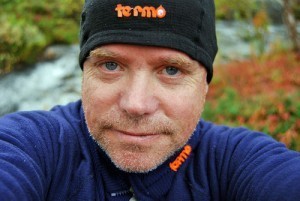
Mikael Strandberg
“At the age of seventeen I hitch-hiked to India, inspired by Herman Hesse´s book “Siddharta”. It is kind of a story about Buddha himself and all the phases of existence he passes through to understand the meaning of life. Therefore, I wanted to become a Buddhist monk. But after ten days in a monastery I realized that being ad infinitum silent and scratching one’s bum in boredom, wasn’t my path to understanding. Instead I cycled from Chile to Alaska.” (From Mikael Strandberg’s “My Testament of Life”)
Is it an intrinsic part of the human condition to be always seeking something? It seems to me that quite a number of our adventurers are seeking something more than just a new vista, or new friends, or fame and glory. There is a deeper search taking place – for self-knowledge, or reconnection with nature, or spiritual fulfillment.
There is no doubt a vast spectrum of reasons why adventurers do what we do – but certainly this spiritual quest resonates with me. When I embarked on my first ocean, I was definitely hoping for some kind of insight. I was in a very spiritual frame of mind, and had even considered entering a convent (don’t laugh) for the purity of the time alone to cogitate and contemplate. I mentioned in my blog about Jason Lewis that I was influenced by the story of a British Buddhist nun.
Ah yes, life could have taken a very different path!
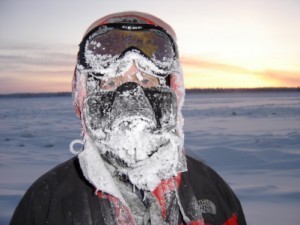
Minus 57 degrees C
Now more than ever, we in the Western world live in a secular society, where wealth rather than goodness has become the preeminent measure of our success as human beings. Most people no longer aspire to riches in heaven – riches right now are what we’d prefer.
But does this leave a void? Does the health of our bank account really reflect the health of our spirit?
For many of the adventurers who have appeared on this podcast, it seems that their riches come from experiences, that the only greed they exhibit is a greed for new places, people, and cultures.
I was intrigued by Mikael’s enthusiasm about his recently adopted neighbourhood of Moss Side in Manchester, with its cultural diversity, interesting pubs…. and grinding poverty, gun crime, and drug problems.
And yet I also understand his enthusiasm. Moss Side is a new and very different place, unlike anywhere he has experienced before – and hence to be relished for that very reason. He doesn’t judge it as good or bad, but as a place that he can explore, follow his curiosity, gain new insights into humanity.
This, surely, is the mindset of the true explorer.
To subscribe to the show via RSS or iTunes, please click on the appropriate button below.
Show Notes
2:30 How did it all start? In Britain! (sort of)
6:00 Exploring the word “explorer”
7:10 What aspect of the journey matters most to Mikael? On Buddhist monks, geezer dads, and the quest to get to know people (including oneself)
10:00 In the course of Mikael’s travels, has he found a heaven on Earth?
12:40 Tough times by the Kolyma River
14:10 What does it feel like to be in -60 degrees C? Including the Hunter’s reflex, and the best clothes for the job
18:00 Which is harder for Mikael: extreme cold or extreme heat?
19:40 What does Mikael want his audience to take away from his communications? Clue: it’s NOT motivation!
21:50 Is it a big world, or a small world? How diverse are we? Still very diverse (and that’s just Moss Side!)
27:25 Does Mikael have confidence in human beings?
29:05 How does Mikael feel about the future?
30:55 One life – live it! (and misbehave!)
32:30 Adventures in England – and possibly an epic trek from Moss Side to North London
37:00 Roz’s book recommendation: Dirk Gently’s Holistic Detective Agency, by Douglas Adams. A thank you to our sponsors, Audible.com. To claim your free audiobook, please follow our Adventure Podcast affiliate link to help support our show and keep us on the air.
Links
March 12, 2014
Adventure Podcast #26: Arita Baaijens, Desert (and Mountain) Explorer
I loved this wide-ranging and in-depth conversation with Arita Baaijens, a Dutch biologist, explorer, photographer and the author of several books and numerous articles. She has carried out more than 25 expeditions (3-6 months at a time) with her own caravan of camels all over Egypt and the Sudan, where her knowledge of the desert – and camels – often put her male companions to shame.
In 2013, she left the desert behind to spend 101 days on horseback as she explored the Altai Mountains, a little-known region that lies on the border of Russia, China, Mongolia and Kazakhstan.
Heaven on Earth

Arita Baaijens
“We do not believe in a heavenly paradise,” says Danil finally. “Our landscape offers everything the soul needs to develop completely.” (extract from an article by Arita Baaijens – The Search for Shambhala)
Are some places more significant – or more sacred – than others? The fact that ley lines intersect there, or the sun strikes that spot at dawn on midsummer’s day, or that mountain’s snowpeak provides life-giving water to the people below – do these things in themselves make a place holy?
Or is it due to the fact that some places are regarded as more sacred that brings pilgrims and believers to that place, and it is their reverence for it that imbues it with sacredness?
On the flipside, do places like Ypres, or Auschwitz, or a house where violent murders were committed, also have a spiritual or emotional echo, a more sinister kind of vibration?
I suspect we have all felt a little frisson in certain locations – an appreciation of their beauty, or a sense of serenity, or a shiver of horror.
The problems arise when a place that is special to some people is affected by the activities of other people who don’t hold it in the same regard.
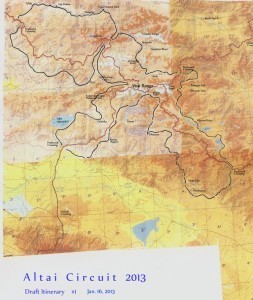
Arita’s route around the Altai
Many sacred indigenous sites have now been violated by industry. The San Francisco Mountains in Arizona have been mined for white pumice to be used in the manufacture of stone-washed jeans, and a ski resort allowed to use tainted wastewater to make artificial snow, thereby polluting the sacred waters. Even though I’m not religious, I know I would be appalled if a cathedral or a temple or a synagogue was desecrated in an analogous way. Yet to many Native Americans the San Francisco Mountains are as sacred as any holy building.
And there are indirect impacts too. In 2003 I took part in the annual pilgrimage of Qoyllur Riti in Peru, which may well soon succumb to climate change. Pilgrims traditionally spend the night on the glacier, wrestling with the spirits until dawn, but the glacier has retreated 600 feet in the last 20 years. The devout are no longer allowed to bring ice from the glacier back to their communities to provide holy water – a futile attempt to prolong the life of the shrinking glacier. When the glacier finally disappears, not only will the spirit of El Señor de Qoyllur Riti have departed, but at least as seriously, the water supply for surrounding villages will also disappear.
For a diminishing number of cultures, our entire planet was a source of wonder and mysticism. For an increasing number of cultures, nothing is sacred in the pursuit of materialism and money. As humankind treads ever more heavily on our planet, and the remote places become less remote, more travelled, where will we go to replenish our energy and feed our souls?
“Shambhala gradually came to be seen as a Buddhist Pure Land, a fabulous kingdom whose reality is visionary or spiritual as much as physical or geographic.” (Wikipedia)

Arita and friend
Arita’s Advice for Young Explorers (but probably equally applicable to old explorers!)
1. Don’t believe people who tell you it cannot be done!
2. If you don’t have the money to pay for your expedition, go anyway.
3. Do it your way.
4. Learn about the local culture and learn the basics of the local language before you set off.
5. Buy a horse or camel if you travel with animals, and be your own boss
6. If you decide to work with an interpreter, TEST him or her first under trying circumstances if you can. May save you a lot of trouble.
7. Never give up.
To subscribe to the show via RSS or iTunes, please click on the appropriate button below.
Show Notes
1:45 Why did Arita switch from desert to mountains?
3:40 The allure of the desert
8:40 Solitude, purification and religion
12:30 On non-existence
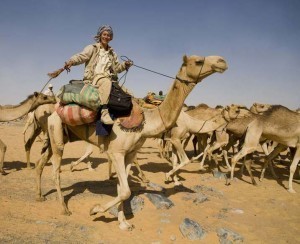
Arita’s preferred mode of transport
14:30 The short guide to keeping a camel alive
17:45 What inspired the trip to the Altai Mountains?
18:45 The challenges of teamwork
21:45 A picture in words of the Altai Mountains
24:40 Does science interfere with sensing? How Arita combined the two
26:55 Experiencing nature through the eyes of the local culture, “Nature does communicate if you give it attention… if you don’t consider yourself completely separate from everything around you.”
31:00 On belief and believers
32:30 Maybe science is not the ultimate truth – on being provoked into new perspectives
34:50 Should we value nature for itself, or for its financial value to humankind? With a side note on scary dogmatic environmentalists
38:15 Kicking a chair leg away from people to make them wobble
39:40 Personal reinvention – how does Arita do it?
42:00 Staying in touch with Arita
43:40 This week’s audible.com recommendation from Producer Vic: Five Days at Memorial – please follow our affiliate link to order your FREE audiobook
Links
Expedition to Paradise (aka the Altai Mountains)
March 5, 2014
Adventure Podcast #25: Our Semi-Anniversary
This week we bring you a special show, to celebrate 6 fun-filled months and 25 scintillating episodes of the Adventure Podcast. Producer Vic and I look back over our first half-year and celebrate our wonderful guests. We also have a bit of a gossip and a catchup, and I deliver some breaking news about my audiobook(s).
On Reflection
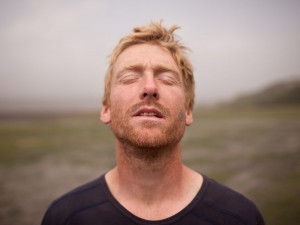
Alastair Humphreys (photo by Chris Herwig at thegreatdiscontent.com)
As Vic and I remark on the show, there are several themes that we’ve noticed emerging from our guests so far.
One is a refreshing lack of chest-thumping, I’m-so-amazing, don’t-try-this-at-home egomania. Quite the contrary – many of our guests give talks and write blogs and manifestos specifically aimed at would-be adventurers to encourage them to get outside their comfort zone and give it a try.
Another is the glowing reports that we’ve heard from so many of our guests about the kindness, generosity and hospitality that they’ve witnessed all across the world in the course of their travels.
And a third is the charming humility and openness of our adventurers, a willingness to admit to their vulnerabilities, and an ability to share the struggle and hardship inherent in many of their adventures.
I hope that the combination of all the above, will have inspired many of you to take on your own adventures, to know that you don’t have to “that kind of person to do something extraordinary, to trust in your fellow humans no matter what their colour or culture, and to know that struggles and setbacks are not failures – they are where vacations end, and adventures begin.
Happy adventuring!
Links
Audiobook of Stop Drifting, Start Rowing
Or, if you haven’t already signed up for Audible, I’d highly recommend that you use our affiliate link so you can claim your FREE audiobook – and we get $15 to keep our podcast on the air!
<
To subscribe to the show via RSS or iTunes, please click on the appropriate button below.
February 26, 2014
Adventure Podcast #24: Jason Lewis, First Human-Powered Global Circumnavigator (and a lot more besides)
I have to confess that I am a little in awe of this podcast’s guest, and I don’t say that lightly. Between 1994 and 2007, Jason Lewis travelled over 45,000 miles under his own power to complete the first human-powered circumnavigation of the world. He used bicycles, rollerblades, kayaks, swimming, rowing, walking, and his trusty pedal-powered boat Moksha to travel though 37 countries in 5 continents, and across 2 oceans and one sea.
Jason and I have never actually met, although I have met two of his Moksha crewmates, and Jason and I had quite a bit of correspondence in the run-up to my landing in Tarawa in the middle of the Pacific, where he had also landed.
Who Are You Really?
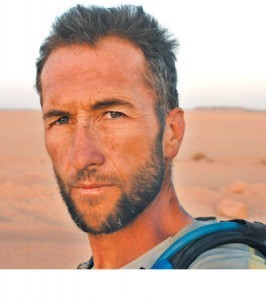
Jason Lewis
“If you remove yourself from the day-to-day humdrum and all that surrounds you and supports the idea about who you think you are – what is left? Who are you really?” (Jason Lewis)
In an era when the word “epic” is overused to the point of meaninglessness, Jason Lewis re-calibrates the word as it relates to adventure. His 13-year odyssey is positively biblical in its scale.
And yet the impression I take away from Jason’s book and our conversation is that, for him, the most important journey was the inner one. It was not the number of miles, countries or continents that he covered, but the number of layers that he could strip away from our superficial perceptions of reality, in his quest to discover the essential truths beneath.
Physical hardship has long been sought out as a route to spiritual growth. When I read about Jason sleeping in a shed full of swans, or in parks, or under any kind of rudimentary shelter in between his voyages, it reminded me of the Indian sadhus. The Sanskrit terms sādhu (“good man”) and sādhvī (“good woman”) refer to renouncers who have chosen to live a life apart from or on the edges of society to focus on their own spiritual practice. Many of them are naked, bathe in cold water, meditate daily, and live an ascetic life, turning their backs on materialism. Remind you of anybody?!
I was inspired in my decision to row the Atlantic by a book called, “Cave in the Snow ”, by Tenzin Palmo, originally Diane Perry from the East End of London, who converted to Buddhism and spent 12 years alone in a remote cave 13,000 feet up in the Himalayas. She grew her own food and slept in a traditional wooden meditation box, three feet square. Again, not so different from life on board a human-powered vessel.
”, by Tenzin Palmo, originally Diane Perry from the East End of London, who converted to Buddhism and spent 12 years alone in a remote cave 13,000 feet up in the Himalayas. She grew her own food and slept in a traditional wooden meditation box, three feet square. Again, not so different from life on board a human-powered vessel.
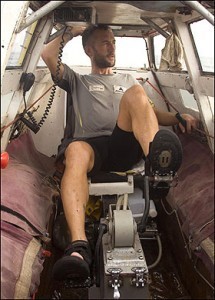
Aboard the pedal-powered boat Moksha
What is it about the wilderness – maybe particularly the ocean, on this now-overcrowded planet – that is so seductive to the spiritual seeker?
Could it be that, back in an earlier era when we all lived in wilderness, we were on a daily basis connected with something larger than ourselves? That we understood that everything is interconnected and interdependent? And even now that we are mostly urbanised and materialised and “civilised”, we sometimes feel the urge to get back into the wilderness, to reconnect, to try and rediscover that part of ourselves that has got all covered up by the multiple veneers of our new reality?
“It is easier to sail many thousand miles through cold and storm and cannibals, in a government ship, with five hundred men and boys to assist one, than it is to explore the private sea, the Atlantic and Pacific Ocean of one’s being alone.” (Henry David Thoreau)
Moksha: means emancipation, liberation or release. In eschatological sense, it connotes freedom from saṃsāra, the cycle of death and rebirth. In epistemological and psychological sense, moksha connotes freedom, self-realization and self-knowledge. (Wikipedia)
To subscribe to the show via RSS or iTunes, please click on the appropriate button below.
To claim your free audiobook, please follow the Adventure Podcast affiliate link. Today’s recommendation is Zen and the Art of Motorcycle Maintenance.
Show Notes
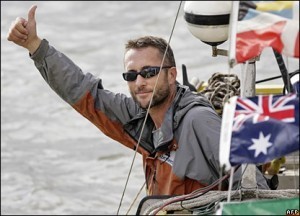
Pedalling back into London after 13 years
2:00 Jason and the school careers adviser: “How can you know what you really want to do until you really know who you are?”
4:00 Flying the coop: “My fear was blindly subscribing to the whims of an increasingly materialistic society, with its shallow mediocrity and hollow indulgences, offering no deeper meaning or purpose than the indiscriminate production and consumption of Stuff, the treadmill existence of human battery hens.”
6:00 The long and winding road to adventure (via window cleaning and a dodgy-sounding band)
7:00 Steve Smith and Jason Lewis – comrades in philosophy as well as adventure (Apology: I have no idea why I said Salcombe is in Cornwall. As any fool knows, it’s in Devon.)
9:00 Teamwork and spiritual enlightenment – are they compatible?
14:20 Solo or team? Jason has a uniquely broad experience of solo, various crewmates, same crewmate twice with very different outcomes. Three is NOT a crowd – actually the sweet spot.
18:15 The importance of laughter – and a top tip for frightening away pirates
20:00 The wonders of being weird – bizarre forms of transport bring out the best in strangers
21:30 Paddling vs pedalling, with an honourable mention of Peter Bird
26:50 Bringing mindfulness back to dry land
28:05 Dicing with death
31:00 DON’T LEAVE THE BOAT!!!
32:00 Becoming a sea creature
33:00 Do explorers explore in order to prove themselves? “If you are a brave man you will do nothing: if you are fearful you may do much, for none but cowards have need to prove their bravery.” (Apsley Cherry-Garrard)
36:00 What do we have to show for 46 years of life? Not much stuff, but lots of experiences.
37:00 Since the adventure – on writing, money/worth, adventure, and integrity
41:00 Staying in touch (and NO! I did not really think that this Jason Lewis was )
Links
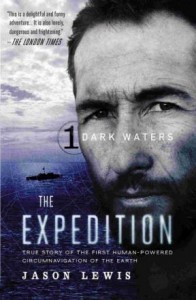
The (fantastic) book
The circumnavigation website – tons of great stuff here
The book – Dark Waters (The Expedition Trilogy, Book 1): True Story of the First Human-Powered Circumnavigation of the Earth (Volume 1)
- recommended!!
A great interview in Outdoor magazine
February 20, 2014
Adventure Podcast #23: David Kroodsma, Climate Change Missionary
There must have been something in the air in 2005 – David Kroodsma set out on his journey the same month I set out on Atlantic (Nov 2005) but arrived a year later (March 2007). In the meantime, he and his bicycle had covered 16,000 miles across 16 countries, from San Francisco to Tierra Del Fuego. And, just as I was using my ocean rowing to raise awareness of environmental challenges, David was using his bicycle rides to raise awareness of climate change, which he had studied for his Masters degree.
I first met David back in 2009, when he and I were both taking part in the Climate Ride from New York to Washington DC. That winter we were also both in Copenhagen for the COP15 climate change conference, where he had won a competition to become a Hopenhagen Ambassador for the Huffington Post. And we’ve met up a number of times since in San Francisco to discuss environmental advocacy. So I was delighted to welcome him to the show.
Climate Change Missionary
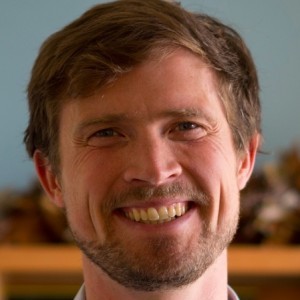
David Kroodsma
“The person most converted on a mission is usually the missionary.” (David Kroodsma)
It was a real delight to talk with David Kroodsma about his adventurous environmental advocacy. It seems that, like mine, his adventure started out as seeming like a great platform for a message, but became so much more than that – that the adventure became an intrinsic part, not just of the message, but of the messenger.
What impacted me most about this conversation was the point, well made by David but all too often forgotten, that environmental challenges do not arise in isolation, but are engendered by the cultures and the economic conditions in which people exist.
So if there is a culture where people watch TV programmes about people who are living more luxurious lifestyles than they themselves are, it is a natural response to want to improve their standard of living. Fairness is a powerful psychological driver, and if someone else has more than we do, we want to bring them down, or raise ourselves up, or both. Look at how many of us in the developed world feel about the 1% – I would guess a combination of self-righteous disgust and/or envy. It may be worth reminding ourselves that while we’re looking at the 1%, the developed world is looking at us, the 10% or whatever, and wanting what we have.
David also pointed out that there are two possible approaches (or a combination of them) to creating the changes necessary if we are to have a sustainable future: the technological approach, and the cultural approach.
I had (as you may be able to tell from the conversation) been sceptical about using technology to solve our problems, feeling that it ran contrary to Einstein’s dictum that “Problems cannot be solved with the same mindset that created them”.
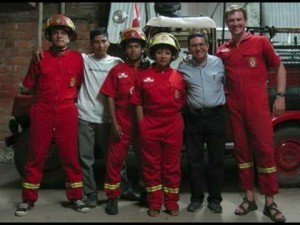
David often stayed in fire stations. Uniform a bit short for American-length legs!
But maybe Buckminster Fuller was right, when he said, “You never change things by fighting the existing reality. To change something, build a new model that makes the existing model obsolete”.
But what kind of model? The word could refer either to a cultural model, or a technological one.
In a perfect world, maybe we would change the culture so that instead of aspiring to greater wealth as individuals, we sought instead to achieve better distribution across society. (Whoo, I’m glad I’m writing this in London, where I can say such things without being branded a communist!)
But we’re not in a perfect world. We can’t fight the existing reality: that the majority of humans will always aspire to improve their lot, especially when presented daily with images of people who have more than they do.
So maybe David is right, and improvements in technology are what we need, so we can meet the growing per capita needs of a growing population from the finite resources available on the Earth.
What do you think?
(But for an interesting counter-argument, read Paul Gilding’s The Great Disruption: Why the Climate Crisis Will Bring On the End of Shopping and the Birth of a New World )
)
Other great quotes from David:
“Poverty is the biggest environmental problem. How can we make clean energy cheap enough so people use it instead of coal?”
“How can we become wealthy and non-polluting?” (Wealth in the sense of quality of life)
“It’s about sharing, and it’s about quality of life. How can we make it better?”
To subscribe to the show via RSS or iTunes, please click on the appropriate button below.
Show Notes
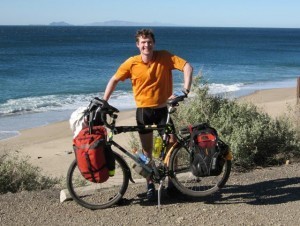
A fully-laden bike
3:00 What first inspired David to ride from San Francisco to Tierra del Fuego? The 900-mile warmup lap from Portland to San Francisco
4:55 How much was it a personal crusade, how much was environmental campaign?
7:00 Getting the message out via presentations in schools, the media, blogging
8:30 How the mission changed the missionary
9:50 The physical journey – and the relative hazards of ocean rowing and bike touring
18:20 What?! He never felt like quitting?!
20:00 What is the biggest environmental challenge facing us? The answer may surprise you.
22:50 Is there anyone in the world who doesn’t have a TV? And what is the effect of that?
26:00 The two sides of environmentalism: a) how do we use technology, and b) how do we change our culture to overcome our problems?
28:20 The North American ride
31:00 The existence of climate change deniers – the view from the cycle route
32:30 The greatest enemy: apathy. How to engage the public? Make environmentalism about aspirations, not sacrifices.
35:30 David’s day jobs with EcoWest and Skoll Global Threats – plus the upcoming Asian bike ride
40:30 Environmental advocacy begins at home
***To claim your free audiobook, please follow the Adventure Podcast affiliate link.***
Links
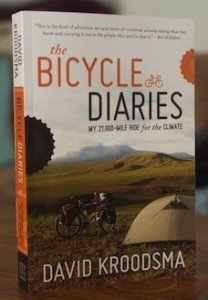
The Bicycle Diaries
David’s expedition website: Ride for Climate
Kickstarter for The Bicycle Diaries
The Bicycle Diaries on Facebook
10 Tips for Biking East Europe
COP15, Copenhagen (Wikipedia page)
David interviewing Sir Richard Branson
February 12, 2014
Adventure Podcast #22: Olly Hicks, Stepping Into The Unknown
Ocean rower Oliver Hicks is nothing if not ambitious. He warmed up by doing the Marathon des Sables and the Yukon River Quest, and by the age of 23 he had rowed solo across the Atlantic from New York to the Isles of Scilly, in a time of 124 days, becoming the youngest person ever to row an ocean solo, and the first to row solo from the US to the UK.
In 2009 he attempted to row solo around Antarctica, an incredible challenge which would have taken him nearly two years, but didn’t go quite according to plan. That voyage was documented in the documentary, Tenacity on the Tasman, and I was there at the premiere in Leicester Square a few years ago, a very glamorous occasion, at which a couple of Bransons and Kate Middleton were also present.
Stepping into the Unknown
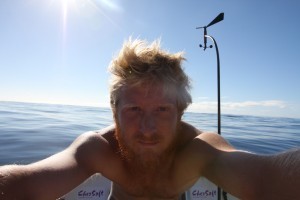
Olly Hicks
“When you’re trying to achieve a first, you are stepping into the realms of the unknown.” (Oliver Hicks)
It was when I was chatting with Sean Conway that it first really hit me what a world of difference there is between achieving a genuine first and any other kind of expedition.
While it is still a major feat to summit Everest or trek to the North or South Pole, we all know that it is achievable in general – it is just down to the individual to discover if they personally can do it.
But with a genuine first (which includes swimming the length of Britain or rowing around Antarctica, but excludes such feats as “first Englishman to summit Everest on a Tuesday wearing pink underpants”) there is a very real risk that what you are taking on may not even be do-able. There is only one way to find out – and that is to go out there and try.
As far as I can tell, there were 2 serious attempts on the South Pole before Amundsen succeeded, 5 attempts on the North Pole and 12 attempts on Everest.
So I fully applaud Olly’s bid to row the Southern Ocean. While I can think of few things more miserable, it is inspiring to hear from someone who is willing to go out there in the true spirit of exploration, with no guarantees – of fame, fortune, or even survival.
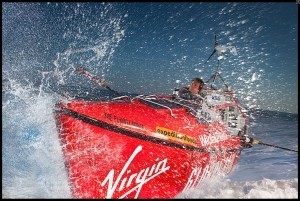
The Flying Carrot
I used to be dubious and deeply concerned about Olly’s bid. To me, it seemed that taking a tiny rowing boat into a part of the world where “below the forties there is no law, and below the fifties there is no God”, was an act of near-lunacy.
But if anybody has the combination of character, experience and tenacity to make this happen, it must be Oliver Hicks.
“From the age of 13 I wanted to row across the Atlantic – I realised that dream despite the endless obstacles. I now want to row around the world – people say it’s impossible, I disagree. We can all achieve our goals however far-fetched they may seem.” (Olly Hicks)
“Man cannot discover new oceans unless he has the courage to lose sight of the shore.” (Andre Gide)
To subscribe to the show via RSS or iTunes, please click on the appropriate button below.
Show Notes
1:25 What inspired Olly, at the age of 14, to declare his intentions to row the Atlantic?
4:15 And why the North Atlantic? Inspired by Peter Bird and looking for a world first
7:40 Frustration on the North Atlantic. “It’s all about how you deal with it psychologically, and if it gets to you, and it winds you up, then it will make you go mad.”
9:30 Moving the goalposts and the vagaries of record-setting
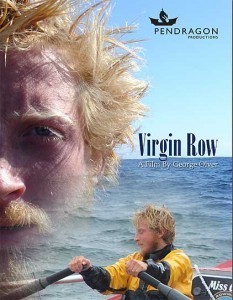
Virgin Row
11:50 The joys of solitude – usually
13:40 The Southern Ocean; “the arsehole of the world”– reference to Matt McFadyen’s catastrophic capsize there (my podcast with Matt is here)
17:15 Tenacity on the Tasman
23:40 The unscheduled suspension of the voyage in New Zealand: “If you embark on these crazy projects… you do have a responsibility to get yourself out of trouble”
25:25 Our mutual friend, Prince William, and discussing whether it is possible to successfully row the Southern Ocean
30:30 Olly’s plans for Southern Ocean 2.0 with a new boat design, referring to Charlie Pitcher’s design and Jim Shekhdar’s old boat (here’s a blog post from my meeting with Jim Shekhdar in 2006)
33:25 The Golden Age of Exploration, when adventures were long and hard and unpleasant, the opposite of instant gratification
35:45 What is the connection between having ginger hair and the quest for adventure?!
36:50 Olly’s current adventures
To claim your free audiobook, please follow the Adventure Podcast affiliate link.
Links
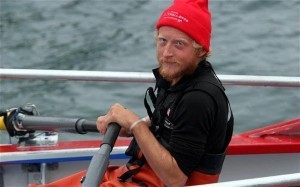
Love the Jacques Cousteau hat!
Tenacity on the Tasman - the film
Olly’s TEDx talk
My blog post about Olly’s abandonment
Olly’s charity: Hope and Homes for Children
February 6, 2014
Adventure Podcast #21: Rosie Stancer, Polar Explorer Doing What Is Necessary
Rosie and I first met back in 2005, when I wanted to pick her brains about expedition nutrition. Memorably – and accurately – described as a cross between Tinkerbell and the Terminator, Rosie is an outstanding polar explorer. In 1997 she was part of the McVities Penguin Polar Relay team. Listeners might remember that one of our early guests was Victoria Riches, who was also part of that all-female team.
Five of the women enjoyed that expedition SO much that in 1999 they completed their own expedition to the South Pole.
Rosie then branched out on her own. In 2004 she walked alone to the South Pole, alone and without resupply, breaking the original speed record, but another woman that same season beat the record by even more.
In 2007 she was set to become the first woman to trek solo to the Geographic North Pole, an attempt that saw her amputate two of her toes, and reluctantly concede defeat just 89 miles short of her goal.
Doing What Is Necessary

Rosie Stancer
“You don’t cry, you don’t whinge, you get up and you keep going.” (Rosie Stancer)
I confess to being morbidly fascinated with the fact that Rosie amputated two of her toes while bidding for the North Pole in 2007. I’m not good with the concept of amputation at the best of times, but to self-amputate, with not so much as a stiff tot of rum to dull the pain, filled me with a prurient kind of horror. It turned my stomach to imagine the scene, but at the same time I wanted to find out more.
And, strangely, as Rosie described the incident, my horror was replaced by an understanding of why she had little choice. It made perfect sense. As with Aaron Ralston cutting off his arm in order to free himself from a fallen rock and certain death, when you hear the full story you understand that the amputation was the lesser of the evils. In a survival situation there is no place for the self-indulgence of squeamishness.
“There are two realities – the one here, and the one out there… If you transport yourself back into that environment [the Arctic], you do what is necessary.”
As Rosie said, what would be unimaginable in (so-called) civilisation becomes not just conceivable but necessary when you’re alone in the wilderness with two gangrenous toes. It’s all to do with context – and motivation.
Motivation, as you might have gathered by now, is one of my favourite subjects. How do we find the courage to do what would once have seemed unacceptable? Often, it’s because the alternative seems even more unacceptable. You cut off your arm if the alternative is death by dehydration. You cut off your toes if the alternative is spreading gangrene.
And you set out on big scary expeditions if the alternative is to lead a life as one of those “cold and timid souls who know neither victory nor defeat” (Theodore Roosevelt).
“Ability is what you’re capable of doing. Motivation determines what you do. Attitude determines how well you do it.”
(Lou Holtz, legendary US football coach, quote from Rosie’s website)
“It is the Arctic who is in control, and she’s capricious and feckless and toys with you.” (Rosie Stancer)
“Going out there to conquer the Arctic – you can’t do that. It’s bigger and stronger than you.” (Rosie Stancer)
SPECIAL NOTE: The podcast itself hasn’t gone online yet, but as we’re already a day late I wanted to get this blog posted. I’ll add the podcast just as soon as we get it online.
Show Notes
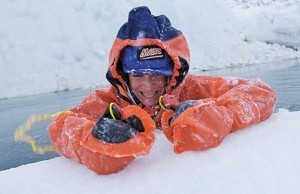
Rosie in deep water
2:20 Was Rosie always adventurous? No! From hotel PR to polar explorer
3:20 How was Rosie so sure that polar exploration was for her?
4:20 Rosie’s gruelling training regime, challenging both physically and psychologically
6:30 The challenges of the Arctic
7:50 How it feels being away from her husband and son – and how she uses them for motivation
9:25 Is there still anything that scares Rosie?
11:20 The inner voices that help the solo adventurer
13:00 The Field Marshall to the rescue
21:00 Why it’s good to treat yourself like an idiot
23:00 Being followed by a grand piano – hallucinating in Antarctica
24:15 Amputating toes in the Arctic
29:15 Returning to the Arctic, and Rosie’s strategy for coping with the rapidly changing ice cap
32:20 Aging and exploration: losing bounce but gaining endurance, strength… and patience
34:00 Being a woman in a traditionally man’s world: the double-edged sword of upsetting preconceptions
38:10 Rosie’s upcoming adventures and book – Isolation
39:45 Rosie’s thank yous
Thanks to our the sponsors of the Adventure Podcast, Audible.com, and Producer Vic’s book recommendation – Tom Wolfe’s Back to Blood. Please follow our affiliate link to get your free audiobook.
Links

A little light training
Martin Hartley, polar photographer
Rosie’s training – check out the video!
January 29, 2014
Adventure Podcast #20: Lloyd Figgins, Making Crazy Expeditions Less Crazy
Lloyd Figgins is an adventurer and speaker, and a risk management specialist. He has visited over 60 countries, and (of course) has rowed across an ocean – the Atlantic in 2011. He used that voyage to conduct scientific research into marine creatures, and continued that work in summer of last year up in the Arctic, particularly focusing on whales and dolphins.
When Life Gives You Lemons, Forget The Lemonade – Make A Risk Assessment Plan
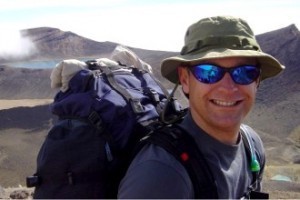
Lloyd Figgins
“There I was lying paralysed in a hospital bed… one route was to go and wrap myself in cotton wool and never do anything adventurous ever again…. or [the other route was] I know how short life can be: I want to go and live it to the absolute full.”
(Lloyd Figgins)
Lloyd Figgins could have been forgiven for taking a broken neck and a half-paralysed body as an excuse for living a soft life. But he chose the opposite route, choosing to go out and see as much of the world as possible, pushing himself beyond boundaries both physical and geographical.
Rather than avoiding risk, he chose instead to manage it, following his philosophy that crazy things are only crazy if you’re not properly prepared.
I loved the metaphor he quoted, of risks being like a row of lemons on a slot machine. One or two lemons probably won’t have consequences. But if all your lemons come up, you’re in real trouble. The point of having a risk assessment plan in advance is to reduce the likelihood of a full row of lemons.
Let’s take a couple of examples:
1. Captain Scott, attempting to lead the first expedition to successfully reach the South Pole in 1911, had a mounting list of lemons (source: Wikipedia):
- The ponies were chosen by the dog expert who knew nothing about ponies, and proved to be poor quality and ill-suited to Antarctica
- Their ship was trapped in pack ice for 20 days, allowing less time for preparation before the Antarctic winter
- One of the motor sledges fell through the ice and sank as soon as it was unloaded from the ship
- These problems led to the main depot being laid at an easier location, 35 miles north of its planned position
- Scott chose not to take the advice of Oates, to kill the ponies and use them for food
- Atkinson countermanded Scott’s orders to rendezvous with him at latitude 82
- Finding the Norwegian flag already at the South Pole, planted there 5 weeks earlier by Amundsen, had a huge impact on the morale of the men.
A fierce blizzard kept the dwindling team tent-bound 11 miles short of the food depot. The three men died of cold and starvation. If the depot had been at the position originally planned, they would have reached it 24 miles before the spot where they died.
Even Scott acknowledged their strategy had been risky: “We took risks, we knew we took them; things have come out against us, and therefore we have no cause for complaint, but bow to the will of Providence, determined still to do our best to the last.” All very noble and stiff-upper-lip, but certainly not the intended outcome of the expedition. Just too many lemons to contend with.
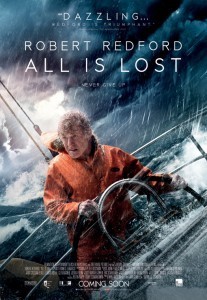
All is Lost – and deservedly so
2. All is Lost, as discussed by Lloyd and me. Lemons galore.
- Running into a container was not his fault, but a lemon nonetheless, and one for which he could have been better prepared
- A weak repair due to inadequate repair kit
- Completely inadequate communications
- No emergency beacon (EPIRB)
- No grab bag, and if he’d had one, it should have had a GPS and a VHF radio in it
- Leaky water can so his emergency water rations were contaminated by seawater
- Inadequate storm preparation
- Inadequate liferaft survival kit
- Not enough marine flares (and lack of skill in using them)
And worst of all, an apparent lack of will to live. Check out the links below for some incredible stories of sea survival, the common denominator being an indomitable will to survive.
So, if you’re thinking of doing an expedition – at sea or otherwise – do please think carefully about the risks. The point is not to scare yourself out of going, but to make sure you’re ready and prepared – not just for your own sake, but for the sake of the general reputation of the adventure community.
As my erstwhile crewmate Andrew Morris once said, announcing our decision that the Olympic Atlantic Row 2012 was just TOO risky and would be cancelled: “We came here to do something inspiring, not something stupid.”
“Risk comes from not knowing what you’re doing.”
(Warren Buffet)
To subscribe to the show via RSS or iTunes, please click on the appropriate button below.
Thank you to our sponsors, Audible.com. To claim your free audiobook, please follow the Adventure Podcast affiliate link
Show Notes
1:00 Childhood as an army brat in Singapore, eating grubs and millipedes
3:50 From poacher to gamekeeper, via the police force, a bar, and a broken neck
9:30 Learning to walk again
12:00 On the path to international expedition leader
15:00 Expedition risk management: All Is Lost as a case study
17:30 What is your get-out plan?
21:10 The vital importance of self-belief in a survival situation
26:00 The lemons story
29:30 When the going gets tough, the tough get shaving
31:00 Saying yes to crazy things (and making them less crazy)
32:00 Staying in touch with Lloyd
Links
Royal National Lifeboat Institute
True survivors:
- Poon Lim
January 22, 2014
Adventure Podcast #19: Matt McFadyen, Polar Explorer and Motivational Speaker
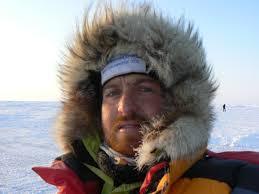
Matt the polar explorer
Matt McFadyen is a record-breaking polar adventurer and sailor, and now an inspirational speaker with Peak Teams. He has been on three expeditions to the North Pole, becoming the youngest Australian to do so, and two long-haul sailing expeditions to Antarctica – in fact, that’s how it all started, back when he was just 22 years old.
And last summer, he and his teammate Cam Webb paddled and sailed the Northwest Passage, covering 2,000 km, or about 1,250 miles in old money, over the course of 41 days.
Excellent Plan vs Mother Nature
I know all too well that feeling of:
Excellent plan meets Mother Nature -> Excellent plan loses, every time.
So when Matt talked about the rapid readjustment that took place when their plan to row the Northwest Passage ran into unexpected weather and ice conditions, I could completely relate. I’d thought I had been extremely well-prepared for the Atlantic in 2005, but how was I to know it was going to be a year of unprecedented storminess? **it happens, and probably even more so in the Arctic, where temperatures and hence ice coverage are changing in ways unknown in human history.
There were two main things I took away from this conversation with Matt (although there was a lot more besides, but you’ll have to listen to the full podcast to get the benefit): one psychological and one environmental.
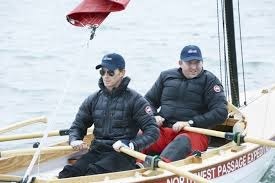
Rowing the Northwest Passage
1. When the parameters changed, Matt and his teammate Cam had to step back, in mid-adventure, and figure out what was most important to them. Was it achieving their original objective? Or was it to remain good friends – and colleagues – and enjoy the journey as much as circumstances would allow?
I have the greatest respect for them for deciding that friendship and enjoyment were more important than attempting to achieve what was now an unfeasibly difficult objective. Who knows – maybe they could have done it, but that prize would have come at what they agreed would be an unacceptable cost. That takes real maturity.
I suspect that many of us can relate to that – possibly in a different context. You can achieve your goal, or you can preserve your relationship. Which is more important to you?
2. The Arctic is changing rapidly. An upcoming Adventure Podcast with polar explorer Rosie Stancer will also raise this subject. The effects of climate change are not felt uniformly around the world, and generally the Poles are feeling the effects more, casting the future of land-to-North-Pole expeditions into doubt.
Paradoxically, the unusual thawing of the ice caps is allowing easier exploitation of the fossil fuels that lie thereunder, and the easier transportation of oil and coal across the Arctic Ocean, thereby accelerating the thawing process. Just because we can doesn’t mean we should.
Again, as with Point 1, we should step back and think about what our priority should be. The short-term objective, or the longer term relationship – with our planet?
“The secret to success…start small, celebrate your progress, and build momentum. To be honest, that’s not the secret, you know this already. The real secret is having the discipline to consistently practice doing these things.” (Cam Webb, Matt’s teammate)
To subscribe to the show via RSS or iTunes, please click on the appropriate button below.
Show Notes
A thank you to our sponsors, Audible.com. To claim your free audiobook, please follow the Adventure Podcast affiliate link
6:00 Matt’s adventurous childhood – and mother
7:15 Matt’s first expedition (and almost his last) – through the Southern Ocean to Antarctica
13:15 The North Pole – winning every day
16:15 How Matt motivates others
20:30 The future of the Arctic ice cap
22:00 The logistics of rowing/sailing the Northwest Passage
25:00 When plans meet reality, and adapting the plans to accommodate the reality
29:00 Iridium Red Spot Beacon
31:00 Climate change and the impacts on the Arctic peoples – and adventurers
33:30 Matt as a motivational corporate speaker
38:20 What next? North Pole? South Pole? Decisions, decisions….
Links
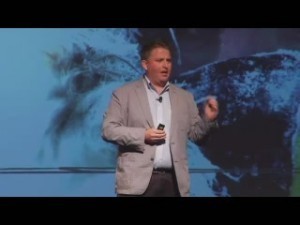
Matt the speaker
Matt the speaker – you have to check this out!
Beyond the Circle – rowing the Northwest Passage
An especially inspiring blog post from Beyond the Circle
January 15, 2014
Adventure Podcast #18: Sean Conway, Epic Swimmer, Cyclist, and Roller of Cheeses
In 2012 Sean Conway set out to become the fastest person to cycle around the world. He was on course for the world record, averaging an amazing 180 miles per day, when he was run over in America suffering a fractured spine. This ended his dream of the world record, but he still carried on at a reduced rate of 140 miles per day and arrived back in London just in time for the Olympics, having cycled 16,000 miles, 12,000 of them with a fractured spine.
Not to be daunted, he decided to make his mark instead by swimming the length of Britain, which he did in summer of 2013. It took him 135 days, during which he battled 20 foot waves, freezing water, getting stung in the face by jellyfish and losing more that 10% of his body weight.
He is the author of two books: Lands End to John O’Groats – the ride that started it all, and World Cycling Stripped Bare. He has two further books in the pipeline, High Water, and The Power of Two.
Sean has adventured by cycling, swimming, running, kayaking, motorbiking and… cheese rolling.
Thinking Adventurously
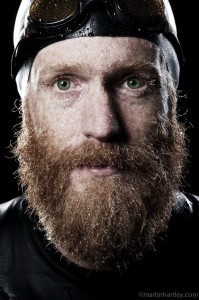
Sean Conway (photo by Martin Hartley)
“Adventure isn’t all about climbing mountains or rowing oceans. Adventure, in its purest form, is simply a way of thinking.”
(Sean Conway)
I hope you’re finding this series of podcasts as inspiring as I do. One of the themes that has really struck me during these last two conversations – with Anna Hughes and now Sean Conway – is that, with the right mindset, we can all weave adventure into our everyday lives.
I confess that this is NOT my normal modus operandi. Believe it or not, I am not a naturally adventurous person. While I can credit/blame my mother for an undeniably intrepid gene, I am also my father’s daughter – my father, who believed his right leg had been designed just long enough to reach from the car seat to the accelerator (or “gas pedal” in North America). I am perfectly happy sitting reading on the sofa, or spending extended periods slaving over a hot laptop keyboard. I have to force myself to get outside and do some exercise.
But, inspired by Anna, Sean, and of course the granddaddy of microadventure, Al Humphreys, I am determined to adopt a more adventurous way of thinking.
Seems to me that a good place to start is with finding more interesting ways of getting from A to B. If Anna can cycle to Brighton for a cup of tea, or Sean can walk from Cheltenham to London for a New Year’s Eve party, then surely I can think of a few interesting ways to get around.
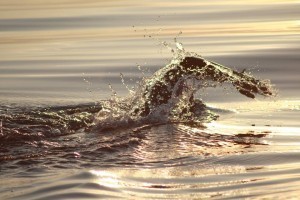
Swimming Great Britain
I was about to give myself a get-out clause and say that maybe I will wait until England is less rain-sodden and the weather is warmer, but then I read about Al Humphrey’s circumnavigation of London via the M25 motorway in the snow – and damn the man – he’s destroyed my excuses.
So what about you? What journeys could you liven up by making them under your own steam rather than by car or train? What hidden treasures might you discover en route? What new friends might you make?
And/or maybe we should all try cheese-rolling at least once in a lifetime….
“Life is either a daring adventure or nothing at all.”
(Helen Keller)
To subscribe to the show via RSS or iTunes, please click on the appropriate button below.
Show Notes
1:00 A thank you to our sponsors, Audible.com, and Roz’s book recommendation: The Power of One, by Bryce Courtenay
To claim your free audiobook, please follow the Adventure Podcast affiliate link
4:20 Introducing our guest, Sean Conway
6:30 Sean’s adventurous childhood – chasing elephants out of the garden and flunking kindergarten
11:00 Thinking adventurously
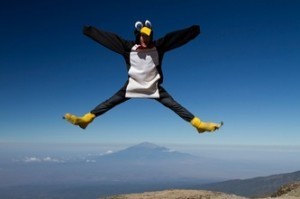
Nobody said adventures had to be sensible
12:15 Mount Kilimanjaro in a penguin suit
14:15 Expedition preparation and the round-the-world speed cycling bid
18:00 Photographing and videoing adventures – top tips from Sean on kit and techniques – REALLY GREAT TIPS!
24:40 StrongManRun
25:30 Sean’s criteria: win it or have fun
26:35 Little Flying Cow – Sean’s mascot and travelling companion
29:20 Swimming the length of Britain – a genuine world first
32:15 Tips on swimming 900 coastal miles (just in case you fancy it)
41:15 What next for Sean? (and another mention for Al Humphreys) – running Great Britain… and Africa?
NOTE: you can apply to join Sean for a leg of his GB run
46:15 A final inspirational message from Sean
Links
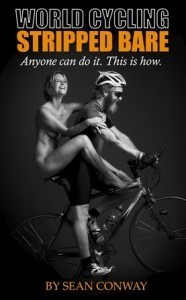
Sean’s upcoming book…!
Sean Conway and Dave Cornthwaite video – very funny!
StrongManRun video - never seen anyone look so muddy and so happy
Stats on swim (scroll down)





